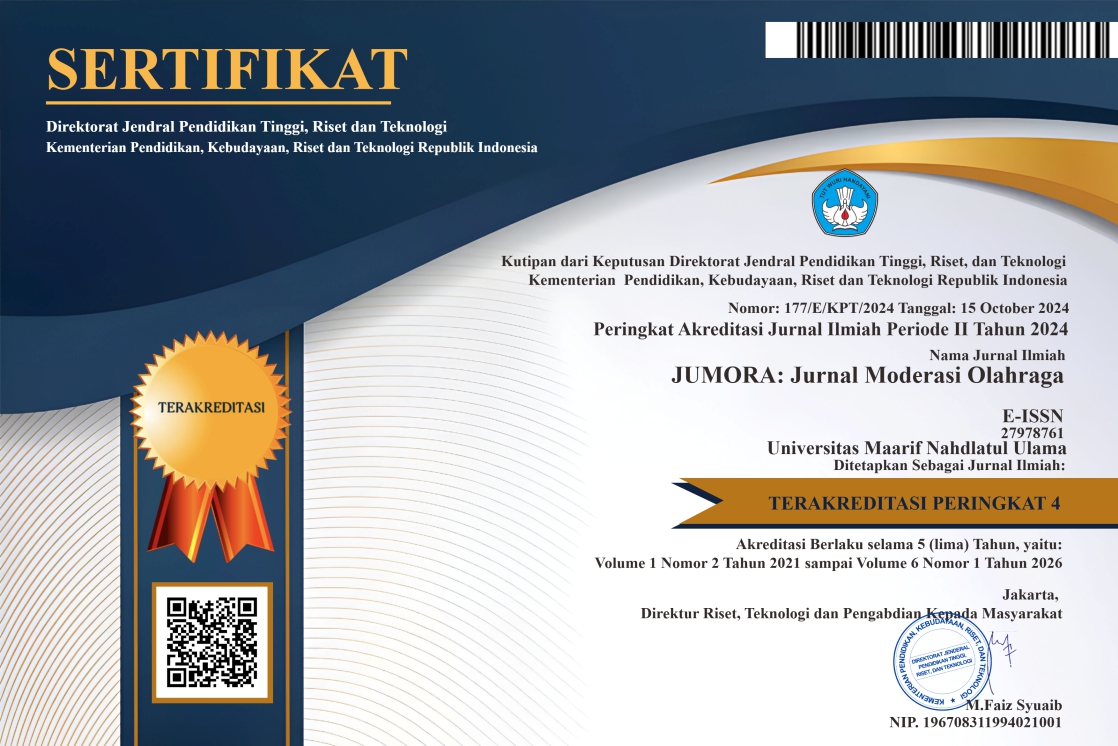The Influence of Learning Methods on Learning Desire and Learning Outcomes of Floor Exercises of Elementary School Students
DOI:
https://doi.org/10.53863/mor.v4i2.1276Keywords:
Jigsaw Learning Method, Conventional Learning Method, Learning Desire, Learning Outcomes, And Floor ExerciseAbstract
This test intends to show the quality of students' learning desires greatly affects students' floor exercise learning outcomes. This test is a type of true experiment that uses pre-test and post-test testing. The data sample used in this study amounted to 30 students from classes V and VI who were randomly selected. Then the data was analyzed using descriptive analysis and analysis of variance (ANOVA) with a significance level of 0.05. The results showed: 1) The learning outcomes of floor gymnastics of students who use the Jigsaw method are higher than students who use conventional methods with an average learning outcome of 88.01: 80,99, 2) Qualitative students in interacting during learning greatly affect the quality of student interest in learning and also student learning outcomes, and 3) The quality of learning interest can also be a measure of student learning outcomes for a lesson. Research conclusions: 1) Compared to the learning outcomes of conventional floor exercise method, the learning outcomes of jigsaw method are higher, 2) The quality of interaction and students' learning desire in learning floor gymnastics has a major effect on students' floor gymnastics learning outcomes, and 3) The quality of students' learning desire is closely related to students' learning outcomes.
References
Acep Haryudin&Ningtyas Orilina Argawati (2018). “Lesson Study to Improve Student English Grammar Mastery Using Jigsaw Technique to The Third Semester Students Of Ikip Siliwangi. Indonesian EFL Journal, Vol. 4(1) January 2018 p-ISSN 2252-7427, e-ISSN 2541-3635.
Artana, Ari (2015). Pengaruh Model Pembelajaran Inkuiri Terbimbing terhadap Hasil Belajar IPA Ditinjau dari Minat Belajar Siswa Kelas V SD Negeri Di Gugus VI Kecamatan Abang Kabupaten Karangasem Tahun Pelajaran 2014/2015. e-Journal Program Pascasarjana Universitas Pendidikan Ganesha Program Studi Pendidikan Dasar (Volume 5 Tahun 2015).
Astiti, Ni Wayan. 2017. Pengaruh Model Pembelajarn Kooperatif Tipe Stad Dan Motivasi Prestasi Terhadap Hasil Belajar Ips Siswa Kelas Vii Smpnegeri 2 Semarapura. Tesis, PPS Universitas Pendidikan Ganesha.
Brahim Theresia K. 2012. Bahan ajar tentang Teori, Model, Pendekatan, Strategi, Metode, Tipe, Teknik, Taktik, Media dan Belajar. Jakarta: UNJ Press.
Kemdikbud. (2013). Permendikbud No. 64 Tahun 2013 tentang Standar Isi Pendidikan Dasar dan Menengah. Jakarta: Kemdikbud Ningtyas Orilina Argawati (2018). “Lesson Study to Improve Student English Grammar Mastery Using Jigsaw Technique to The Third Semester Students of Ikip Siliwangi. Indonesian EFL Journal, Vol. 4(1) January 2018 p-ISSN 2252-7427, e-ISSN 2541-363
Rosdiani, Dini. 2013. Model Pembelajaran Langsung Dalam Pendidikan Jasmani Dan Kesehatan. Bandung: Alfabeta
Sadiyah, Halimatu (2018) Pengaruh Penggunaan Model Pembelajaran Jigsaw dan STAD Minat Belajar Terhadap Hasil Belajar IPS Kelas VI Sekolah Dasar Gugus V Citeureup-Bogor Jawa Barat. Teknologi Pendidikan Volume 1 Nomor 2 Edisi Oktober 2016 Masters Thesis, Universitas Terbuka.
Suparno, 2009. Perbedaan Pengaruh Metode Pembelajaran Jigsaw dan Problem Based Learning (PBL) Terhadap Pencapaian Kompetensi Belajar Terhadap Pencapaian Kompetensi Belajar IPA di Sekolah Dasar ditinjau dari Minat Belajar. UNSPascasarjana Prodi.Teknologi Pendidikan-S810108032-2009.
Swadesi, I. K. I., Wahjoedi, H., Sudiana, I. K., & Dharmadi, M. A. 2019. Pelatihan dan Pendampingan Penggunaan Media Pembelajaran bagi Guruguru SMA PJOK Se-Bali. In Seminar Nasional Pengabdian kepada Masyarakat (Vol. 4, pp. 924-932).
Downloads
Published
How to Cite
Issue
Section
License
Copyright (c) 2024 Dedi Septiawan

This work is licensed under a Creative Commons Attribution-ShareAlike 4.0 International License.
Authors retain copyright and grant the journal right of first publication with the work simultaneously licensed under a Creative Commons Attribution-ShareAlike 4.0 International License that allows others to share the work with an acknowledgment of the work’s authorship and initial publication in this journal











